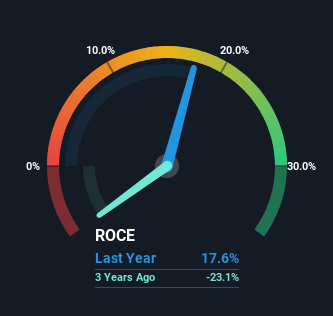- United Kingdom
- /
- Airlines
- /
- LSE:IAG
Returns On Capital At International Consolidated Airlines Group (LON:IAG) Have Stalled

If we want to find a potential multi-bagger, often there are underlying trends that can provide clues. Firstly, we'd want to identify a growing return on capital employed (ROCE) and then alongside that, an ever-increasing base of capital employed. If you see this, it typically means it's a company with a great business model and plenty of profitable reinvestment opportunities. So, when we ran our eye over International Consolidated Airlines Group's (LON:IAG) trend of ROCE, we liked what we saw.
Understanding Return On Capital Employed (ROCE)
For those that aren't sure what ROCE is, it measures the amount of pre-tax profits a company can generate from the capital employed in its business. The formula for this calculation on International Consolidated Airlines Group is:
Return on Capital Employed = Earnings Before Interest and Tax (EBIT) ÷ (Total Assets - Current Liabilities)
0.18 = €3.6b ÷ (€38b - €17b) (Based on the trailing twelve months to December 2023).
Therefore, International Consolidated Airlines Group has an ROCE of 18%. On its own, that's a standard return, however it's much better than the 8.4% generated by the Airlines industry.
Check out our latest analysis for International Consolidated Airlines Group

In the above chart we have measured International Consolidated Airlines Group's prior ROCE against its prior performance, but the future is arguably more important. If you'd like to see what analysts are forecasting going forward, you should check out our free analyst report for International Consolidated Airlines Group .
So How Is International Consolidated Airlines Group's ROCE Trending?
While the current returns on capital are decent, they haven't changed much. The company has consistently earned 18% for the last five years, and the capital employed within the business has risen 22% in that time. Since 18% is a moderate ROCE though, it's good to see a business can continue to reinvest at these decent rates of return. Over long periods of time, returns like these might not be too exciting, but with consistency they can pay off in terms of share price returns.
Another thing to note, International Consolidated Airlines Group has a high ratio of current liabilities to total assets of 45%. This can bring about some risks because the company is basically operating with a rather large reliance on its suppliers or other sorts of short-term creditors. While it's not necessarily a bad thing, it can be beneficial if this ratio is lower.
The Bottom Line
The main thing to remember is that International Consolidated Airlines Group has proven its ability to continually reinvest at respectable rates of return. Yet over the last five years the stock has declined 45%, so the decline might provide an opening. For that reason, savvy investors might want to look further into this company in case it's a prime investment.
One more thing, we've spotted 2 warning signs facing International Consolidated Airlines Group that you might find interesting.
While International Consolidated Airlines Group isn't earning the highest return, check out this free list of companies that are earning high returns on equity with solid balance sheets.
New: AI Stock Screener & Alerts
Our new AI Stock Screener scans the market every day to uncover opportunities.
• Dividend Powerhouses (3%+ Yield)
• Undervalued Small Caps with Insider Buying
• High growth Tech and AI Companies
Or build your own from over 50 metrics.
Have feedback on this article? Concerned about the content? Get in touch with us directly. Alternatively, email editorial-team (at) simplywallst.com.
This article by Simply Wall St is general in nature. We provide commentary based on historical data and analyst forecasts only using an unbiased methodology and our articles are not intended to be financial advice. It does not constitute a recommendation to buy or sell any stock, and does not take account of your objectives, or your financial situation. We aim to bring you long-term focused analysis driven by fundamental data. Note that our analysis may not factor in the latest price-sensitive company announcements or qualitative material. Simply Wall St has no position in any stocks mentioned.
About LSE:IAG
International Consolidated Airlines Group
Engages in the provision of passenger and cargo transportation services in the North Atlantic, Latin America, the Caribbean, Europe, Africa, the Middle East, South Asia, the Asia Pacific, and internationally.
Undervalued with acceptable track record.
Similar Companies
Market Insights
Community Narratives



